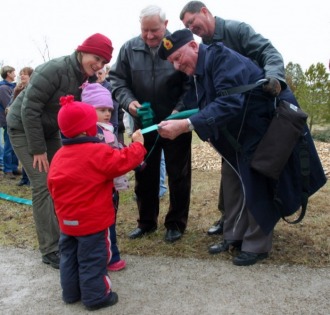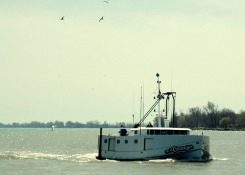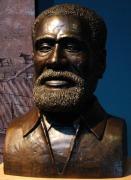Sharing The Secret
Why Wheatley?

Ribbon-cutting ceremony at dedication of Peace Garden
Whatever it is you're looking for, chances are you'll find it here, whether you're a tourist or planning to stay.
Enjoy camping? Three campgrounds, including Wheatley Provincial Park, are just outside town. Birdwatching? Wheatley is right under the spring and fall migration routes of everything from hummingbirds to raptors. Hiking? Three conservation areas are within a ten-minute drive. Fishing? Wheatley is renowned. And if you're hungry, there's not much can beat a Lake Erie perch dinner at our local restaurants. If you'd rather do your own cooking, buy fresh direct from the local fisheries.
And there's another thing Wheatley is known for: Its sense of community. Volunteering is a way of life in this village of 2,000, whether it's organizing the annual Fish Festival or laying new hiking trails or organizing summer concerts or planting a peace garden in Two Creeks Conservation Area.
For more on the village, click on the links to the left.
Enjoy camping? Three campgrounds, including Wheatley Provincial Park, are just outside town. Birdwatching? Wheatley is right under the spring and fall migration routes of everything from hummingbirds to raptors. Hiking? Three conservation areas are within a ten-minute drive. Fishing? Wheatley is renowned. And if you're hungry, there's not much can beat a Lake Erie perch dinner at our local restaurants. If you'd rather do your own cooking, buy fresh direct from the local fisheries.
And there's another thing Wheatley is known for: Its sense of community. Volunteering is a way of life in this village of 2,000, whether it's organizing the annual Fish Festival or laying new hiking trails or organizing summer concerts or planting a peace garden in Two Creeks Conservation Area.
For more on the village, click on the links to the left.
What is Wheatley?

Fishing tug B.M. Cabral entering Wheatley Harbour
Wheatley is home, among other things, to the world's largest commercial freshwater fish fleet. According to the Small Craft Harbours Branch of the federal government, "approximately 300 commercial fishers catch yellow perch, pickerel (walleye), bass and smelt in 45 fishing tugs. The average length of these boats is 68 feet."
The facilities and abundant catches are also well-known to anglers from Ohio, Michigan and around Ontario.
The harbour has room for 15 to 20 pleasure boats in addition to the fleet. A record was set for recreational boat launches in 2008.
The facilities and abundant catches are also well-known to anglers from Ohio, Michigan and around Ontario.
The harbour has room for 15 to 20 pleasure boats in addition to the fleet. A record was set for recreational boat launches in 2008.
Where is Wheatley?

Bust of Rev. Josiah Henson
Wheatley is about as far south in Canada as you can go without getting your feet wet. Find it on a map here. It's less than an hour to the international border crossing at Windsor-Detroit, and 20 minutes from Highway 401, Ontario's major east-west artery. Zoom out on the map for a wider view of the region.
A hiking, biking and camping mecca, the area is also a natural destination for anglers, sport fishermen and daytrippers from the rest of Ontario, Michigan and Ohio. Motorcyclists enthuse about the ride along Lake Erie on the historic Talbot Trail, and Point Pelee National Park, with its unique ecosystem and myriad birds, is close (here), as are numerous wineries (here) and other points of interest (learn more here and here).
The region is also home to some the earliest African-Canadian settlements and homesteads, many founded by slaves escaping from the United States via the famed Underground Railway. Uncle Tom's Cabin in Dresden (learn more here) was the home of Rev. Josiah Henson, the man on whom Harriet Beecher Stowe based her famous book. The Elgin Settlement, also known as Buxton, was the last of four organized black settlements in Canada (here).
The region is also the site of some of the most important battles and skirmishes of the War of 1812, including the capture of Detroit, the defeat of the British fleet at Put-In Bay and the subsequent disastrous retreat by British forces from Detroit up the Thames River toward London (more here).
For Native Canadians, the most calamitous event of the war was the death of their great leader, Tecumseh, at the Battle of the Thames (more here). The site is now well-marked and the nearby Fairfield museum (learn more here) contains much valuable information about Tecumseh and many artefacts from the Moravian mission settlement that was burned to the ground by advancing American forces.
A hiking, biking and camping mecca, the area is also a natural destination for anglers, sport fishermen and daytrippers from the rest of Ontario, Michigan and Ohio. Motorcyclists enthuse about the ride along Lake Erie on the historic Talbot Trail, and Point Pelee National Park, with its unique ecosystem and myriad birds, is close (here), as are numerous wineries (here) and other points of interest (learn more here and here).
The region is also home to some the earliest African-Canadian settlements and homesteads, many founded by slaves escaping from the United States via the famed Underground Railway. Uncle Tom's Cabin in Dresden (learn more here) was the home of Rev. Josiah Henson, the man on whom Harriet Beecher Stowe based her famous book. The Elgin Settlement, also known as Buxton, was the last of four organized black settlements in Canada (here).
The region is also the site of some of the most important battles and skirmishes of the War of 1812, including the capture of Detroit, the defeat of the British fleet at Put-In Bay and the subsequent disastrous retreat by British forces from Detroit up the Thames River toward London (more here).
For Native Canadians, the most calamitous event of the war was the death of their great leader, Tecumseh, at the Battle of the Thames (more here). The site is now well-marked and the nearby Fairfield museum (learn more here) contains much valuable information about Tecumseh and many artefacts from the Moravian mission settlement that was burned to the ground by advancing American forces.
